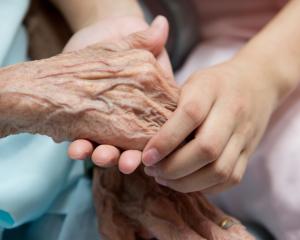
Pip, a 2-year-old male Labrador, goes to work every day in a medical ward with his new owner, a nurse with Type 1 diabetes.
Just three days on the job, Pip has earned his keep.
Trained to detect the smell of a diabetic low, he has picked up two since he started on Wednesday.
It surprises Assistance Dogs New Zealand instructor Julie Hancox, of Te Awamutu, who is spending a few days in Dunedin to help Pip settle in.
Usually, it takes a month for the dogs to become attuned to their owner’s needs, she said.
"He will actually come out ... and interrupted her as she goes past and told her to go and check her bloods."
The bonding period was crucial.
"The closer that his connection is to her the more likely he is to make use of what is training is, to alert her when she goes suddenly down."
On the job in ward 8, Pip keeps a low profile.
He does not accompany the nurse near patients, and stays resting in the corridor.
Because Pip has a specific job, visitors and staff are encouraged not to play or talk to him.
He will be a full-time companion for the nurse, who did not want to be named in this story.
Pip is believed to be the first assistance dog to work in a New Zealand hospital.
"We are so grateful to the hospital for understanding the valuable work that an assistance dog can do to support and reduce disadvantages for one of their staff employees — particularly in this setting where health and safety is paramount.
"This is the first time we have trained and placed a dog to work specifically in a hospital ward environment and we hope, that with staff and public support, Pip will settle in and become just another staff member," Mrs Hancox said.
Medical directorate nursing director Sally O’Connor said the health and safety and infection risks had been considered, but Pip was not considered a risk.
Pip was highly trained and had regular medical checks and vaccinations, Mrs O’Connor said.
"This is a trial, but we’re really hoping that Pip will quickly become part of the team."
Like most workers these days, Pip is subject to a trial period.
His is for three months, but it is hoped he will be able to attend work with his owner permanently.












